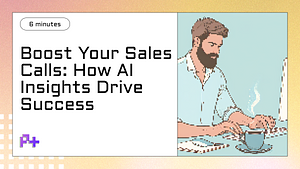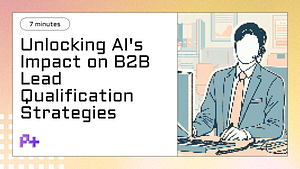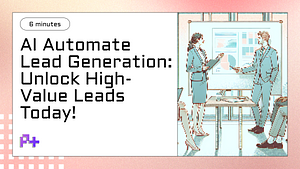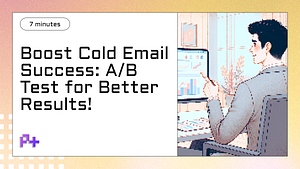Summary
- 1. The Evolution of Lead Generation: How AI is Shaping the Future
- 2. Unlocking High-Value Leads: Strategies for Effective Outreach
- 3. Leveraging AI Tools for Enhanced Lead Quality and Engagement
- 4. Real Success Stories: Transforming B2B Lead Generation with Leadzen.ai
- 5. Future Trends in Lead Generation: What to Expect in the Coming Years
1. The Evolution of Lead Generation: How AI is Shaping the Future
The landscape of lead generation has undergone significant transformation over the past few decades, evolving from traditional methods to more sophisticated, technology-driven approaches. Historically, businesses relied on cold calling, direct mail, and in-person networking to generate leads. However, as consumer behavior shifted towards digital platforms, the need for more efficient and targeted strategies became evident. This is where AI comes into play, revolutionizing how companies identify and engage potential customers. By leveraging data analytics and machine learning, businesses can now automate lead generation processes, making them more effective and cost-efficient.
AI-driven tools enhance lead generation by analyzing vast amounts of data to identify patterns and trends that human marketers might overlook. These systems can segment audiences based on demographics, preferences, and behaviors, allowing for highly targeted marketing campaigns. For instance, predictive analytics can forecast which leads are most likely to convert, enabling sales teams to prioritize their efforts on high-potential prospects. Additionally, AI chatbots streamline initial interactions, providing instant responses to inquiries and nurturing leads at any hour. This automation not only saves time but also improves the overall customer experience, making it easier for potential clients to engage with your brand.
Looking ahead, the future of lead generation will likely be dominated by increasingly sophisticated AI technologies. As advancements in natural language processing and machine learning continue to progress, we can expect even more personalized and efficient lead generation strategies. Businesses that embrace these technologies will not only enhance their marketing efforts but also foster stronger relationships with their customers. By automating lead generation through AI, companies can focus on building meaningful connections and driving conversions, ultimately shaping a more dynamic and responsive sales environment.
2. Unlocking High-Value Leads: Strategies for Effective Outreach
In today's competitive landscape, unlocking high-value leads requires a strategic approach to outreach that harnesses the power of AI to automate lead generation. By leveraging advanced algorithms and machine learning, businesses can identify and prioritize prospects who are more likely to convert. Start by defining your ideal customer profile (ICP) based on demographic data, behavioral patterns, and purchasing history. AI tools can analyze vast datasets to pinpoint these characteristics, enabling you to focus your outreach efforts on high-potential leads. This targeted approach not only increases efficiency but also maximizes the chances of engagement.
Once you have identified your high-value leads, the next step is to craft personalized outreach strategies that resonate with each prospect. Automation tools powered by AI can help you create tailored messages based on past interactions, preferences, and even social media behavior. For instance, utilizing AI-driven email marketing platforms allows you to segment your leads and send customized content that speaks directly to their needs and pain points. This personalized touch builds rapport and trust, making it more likely that your outreach efforts will result in meaningful conversations and ultimately, conversions.
Finally, tracking and analyzing the effectiveness of your outreach strategies is crucial for continuous improvement. AI tools can provide insights into engagement metrics, such as open rates and click-through rates, helping you understand which tactics work best for your high-value leads. By using this data to refine your approach, you can optimize your outreach efforts over time. Furthermore, implementing feedback loops where you gather insights from leads who convert (or don’t) allows you to further enhance your lead generation strategies. In conclusion, by integrating AI to automate lead generation and employing targeted, personalized outreach strategies, businesses can unlock the potential of high-value leads and drive growth effectively.
3. Leveraging AI Tools for Enhanced Lead Quality and Engagement
In today’s competitive landscape, leveraging AI tools for enhanced lead quality and engagement is becoming essential for businesses looking to optimize their sales processes. AI automate lead generation by analyzing vast amounts of data to identify high-potential leads based on specific criteria such as demographics, online behavior, and previous interactions. This capability allows businesses to focus their efforts on leads that are more likely to convert, ensuring that marketing and sales teams can work more efficiently and effectively.
Utilizing AI technologies such as machine learning algorithms and predictive analytics can significantly enrich the lead generation process. These tools can assess the engagement levels of leads by monitoring their interactions with your brand across various channels, including social media, email, and website visits. By understanding which leads are most engaged, businesses can tailor their communication strategies to foster deeper relationships, providing personalized content and offers that resonate with individual prospects. This targeted approach not only enhances lead quality but also increases the likelihood of conversion.
Moreover, AI tools can streamline the follow-up process, ensuring consistent engagement with potential customers. Automated chatbots, for example, can engage visitors on your website in real-time, answering queries and guiding them through the sales funnel. By nurturing leads through personalized interactions and timely responses, businesses can build trust and rapport, which are critical factors in the decision-making process. Ultimately, leveraging AI to automate lead generation not only improves the quality of leads but also enhances overall customer engagement, leading to higher conversion rates and increased revenue.
4. Real Success Stories: Transforming B2B Lead Generation with Leadzen.ai
In the rapidly evolving landscape of B2B lead generation, many businesses are turning to innovative solutions to enhance their outreach efforts. One such solution is Leadzen.ai, a platform that leverages AI to automate lead generation processes. Success stories from companies that have integrated Leadzen.ai into their marketing strategies highlight the transformative impact of AI on lead acquisition. For instance, a mid-sized tech firm reported a 50% increase in qualified leads within just three months of utilizing Leadzen.ai's targeted outreach capabilities. By using AI algorithms, the platform helps users identify and engage with prospects that match their ideal customer profiles, significantly improving conversion rates.
Another compelling example comes from a financial services company that struggled to maintain a consistent pipeline of leads. After implementing Leadzen.ai, their team was able to automate the tedious tasks of data collection and prospecting. This not only saved time but also allowed their sales team to focus on nurturing relationships with high-potential leads rather than sifting through countless unqualified contacts. The result? A remarkable 30% boost in their overall sales performance, attributed directly to the efficiency gained through AI-driven lead generation. This case illustrates how automating lead generation with Leadzen.ai can streamline processes and enhance productivity, leading to substantial revenue growth.
Furthermore, startups have also benefited from the capabilities of Leadzen.ai, especially in a competitive market where every lead counts. One startup in the SaaS industry shared their experience of using Leadzen.ai to identify niche markets and tailor their messaging accordingly. By automating lead generation, they were able to pinpoint industries that were previously overlooked, which resulted in a 40% increase in leads from these new segments. This success story emphasizes not only the versatility of Leadzen.ai in adapting to different business needs but also its potential to uncover hidden opportunities for growth. As more companies embrace AI to automate lead generation, the success stories continue to pile up, showcasing the undeniable advantages of incorporating such technology into B2B strategies.
5. Future Trends in Lead Generation: What to Expect in the Coming Years
As businesses increasingly turn to technology to enhance their marketing strategies, the future of lead generation is poised for significant transformation. One of the most exciting trends on the horizon is the use of AI to automate lead generation. This advancement promises to streamline processes, enhance targeting, and ultimately improve the quality of leads collected. As AI tools become more sophisticated, companies can expect to leverage machine learning algorithms that analyze vast amounts of data to identify potential customers with greater accuracy than ever before.
Another key trend is the integration of AI-driven chatbots and virtual assistants in lead generation efforts. These tools provide real-time engagement with potential customers, answering queries and guiding them through the sales funnel. By automating initial interactions, businesses can nurture leads 24/7, ensuring that no opportunity is missed due to time zone differences or outside business hours. This level of automation not only saves time but also allows sales teams to focus on closing deals rather than qualifying leads, thereby enhancing overall efficiency.
Finally, personalization will play a crucial role in the future of lead generation. AI systems can analyze user behavior and preferences to deliver tailored content and suggestions, making outreach efforts more relevant and effective. As companies adopt AI to automate lead generation, the ability to create personalized experiences will set them apart from competitors. With these advancements, businesses can expect a more data-driven approach to lead generation, where insights derived from AI tools will guide marketing strategies and foster deeper connections with potential customers. As we move forward, embracing these trends will be essential for organizations looking to thrive in a competitive landscape.



